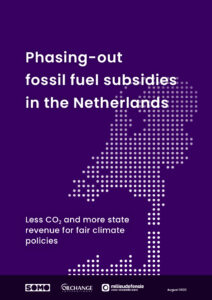
New study estimates the Netherlands’ fossil fuel subsidies at €37.5 billion per year

The Dutch government is providing larger fossil fuel subsidies than previously thought. The report ‘Phasing out fossil fuel subsidies in the Netherlands’ published today by SOMO, Oil Change International(opens in new window) , and Friends of the Earth Netherlands(opens in new window) estimates these subsidies at €37.5 billion per year.
The authors call for an urgent and just phase out of all fossil subsidies by 2025. The CO₂ emissions reductions that would be achieved by ending the mapped fossil fuel subsidies would help the Netherlands get on track to meet its 2030 climate goals. Removing fossil fuel subsidies will also raise additional revenues that can be used to invest in energy efficiency, renewables, and combating energy poverty.
31 fossil fuel subsidies
Never before has there been such a detailed, peer-reviewed mapping of fossil fuel subsidies in the Netherlands. The report identifies 31 fossil fuel subsidies that, combined, provide €37.5 billion per year in fossil fuel subsidies between 2020 and 2022. The subsidies are largely provided in the form of tax breaks that make the production and use of fossil fuels (oil, gas, and coal) cheaper. The report’s calculations are fully transparent, based on the World Trade Organization definition of a fossil fuel subsidy and the United Nations Environment Program’s methodology for measuring fossil fuel subsidies, which both have also been adopted by the Dutch government.
Read the report
-
 Phasing-out fossil fuel subsidies in the Netherlands (executive summary) (pdf, 417.99 KB)
Phasing-out fossil fuel subsidies in the Netherlands (executive summary) (pdf, 417.99 KB)
Small businesses pay the full price
Most of the fossil subsidies consist of tax benefits for large consumers in Dutch industry. From shipping (€6.7 billion) to aviation (€2.4) and from fossil electricity (€5.4 billion) to the oil processing industry (€2.4 billion); large consumers receive rebates, tax breaks, exemptions, or favorable tax rates. These schemes come at the expense of small and medium-sized enterprises (SMEs). After all, small and medium-sized companies usually do pay full price for their gas and electricity consumption.
A fair and just phase-out
The report calls on the government to publish a plan in 2023 for an urgent and just phase out of fossil subsidies by 2025 – a deadline to which the Netherlands has already committed. This should include a clear plan for reinvesting the saved subsidy expenses and raised revenues fairly, including in renewable energy and energy efficiency, social protection measures, and increased international climate finance for developing countries that are hit hardest by the climate crisis. The International Institute for Sustainable Development’s (IISD) Global Subsidies Initiative Integrated Fiscal model (GSI-IF) was used in the report to show that phasing out fossil fuel subsidies alongside these reallocations would allow the Netherlands to reduce its emissions by 13 to 20 percent in 2030 (the equivalent of 15 to 21 megatons of CO₂). This would help get the Netherlands on track to meet its 2030 climate goals.
““Phasing out fossil subsidies kills two birds with one stone: it reduces fossil fuel emissions and raises additional revenue needed to accelerate a social and equitable transition.”
““Fossil subsidies cost billions in taxpayer money, exacerbate the climate crisis, and line the coffers of big polluters. This money can instead be used to insulate millions of homes, transition our energy system, and help countries internationally deal with the blows of the climate crisis. We want the House of Representatives to start phasing out fossil subsidies now. The climate cannot wait for a new coalition.”
““The Netherlands has taken the international stage to promise an end to fossil fuel subsidies multiple times already, but it is failing to live up to its promise. While the world is going up in flames, the government continues to add fuel to the fire by propping up the biggest source of the climate crisis, fossil fuels, with billions in subsidies. With an urgent and fair phase-out plan the Netherlands can deliver on longstanding promises and take the lead within the EU and internationally to ensure other countries follow through.”
The calculations can be found at: https://somo.nu/45CDQcY(opens in new window)
Partners

Related news
-
Phasing-out fossil fuel subsidies in the Netherlands Published on:
 Rodrigo FernandezPosted in category:Publication
Rodrigo FernandezPosted in category:Publication Rodrigo Fernandez
Rodrigo Fernandez
-
Overconsumption of transition minerals will cost us the earthPosted in category:Opinion
 Alejandro GonzálezPublished on:
Alejandro GonzálezPublished on: Alejandro González
Alejandro González -


